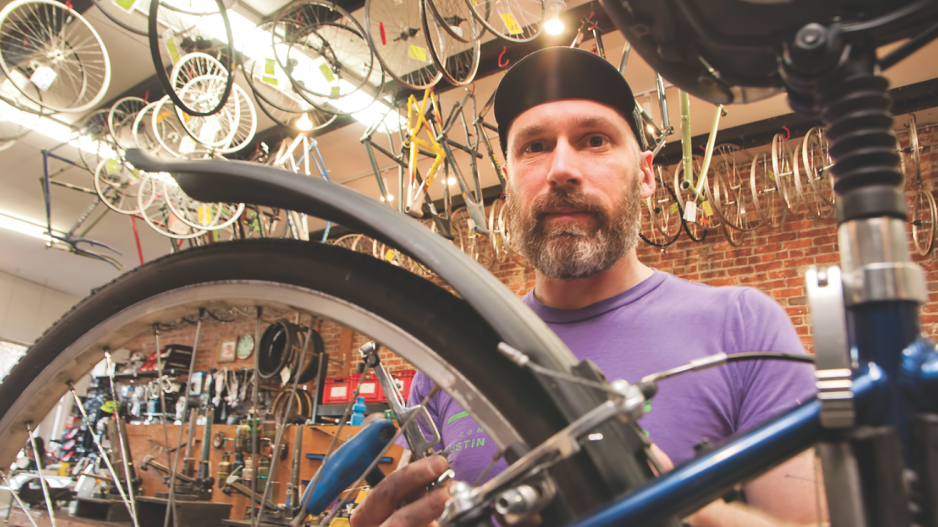Jesse Cooper, project manager for Our Community Bikes, is focused on making more money. It’s top of mind after the 22-year-old organization was forced to move this summer because of a steep rent increase.
The Main Street non-profit fixes bikes, sells new and used items and runs educational and employment programs. The move, which came during the high season, left a gaping hole in Our Community Bikes’ finances. Luckily, the organization found a cheaper space with an understanding landlord, but Cooper knows future rent increases are inevitable.
“Inevitably he wants to raise the rent,” Cooper said. “Any building owner does, as property values go up, as taxes go up.”
This year could be particularly grim for the survival of independent small businesses in Vancouver. Property assessments released on January 4 showed the average increase for commercial properties in Vancouver was 16%, compared with the 5% to 10% in neighbouring municipalities like North Vancouver, Burnaby and Richmond, according to Jason Grant, regional assessor for BC Assessment.
The increase is also striking compared with previous years: in 2015 commercial property values in Vancouver increased an average of 11%; in 2014 they rose 5%.
If the properties have any potential for redevelopment, values have risen as much as 30% to 50% for some commercial retail, especially those located on arterial roads or near transit stations. Businesses will see tax increases if their property value rises more than the average.
Paul Sullivan, a principal at appraisal firm Burgess Cawley Sullivan and Associates, gave as an example an 1,800-square-foot retail space on a 3,000-square-foot lot with the potential to redevelop to 9,000 square feet. Between 2015 and 2016, per-square-foot property values for commercial retail rose to $350 from $225, resulting in an increase of around $17,000 in property tax.
Most commercial tenants in Vancouver pay for the property tax directly as part of their triple-net lease, Sullivan said.
“Small business normally operates at a profit margin of [between] 5% and 10%; it’s a really low margin,” he said. “If I’ve got to raise $17,000 more, I have to do [$170,000] to $340,000 more sales to cover my increase in property tax bill. It’s just not realistic.”
Sullivan believes the City of Vancouver needs to help small businesses by committing to tax “air space” – the value of unbuilt residential – at the lower residential tax rate. He also believes the city should attempt to reduce the gap between business and residential tax: in Vancouver, businesses pay four times more than residential property owners.
Meanwhile, Toronto continues to move toward a goal of making business property tax 2.5 times higher than residential by 2020.
The City of Vancouver has tried to take the sting out of sudden property price increases by using a targeted land assessment averaging system: according to the city, it “applies to ‘hot’ properties above a threshold, which is defined as a property having a year-over-year increase in property value 10% above the class average increase.”
The threshold is determined by the city annually.
Vancouver also moved the ratio between business and residential tax down from 5.9 in 2006 to 4.06 today, but has no plans to narrow the gap further. When additional levies from Metro Vancouver, TransLink and the school board are added, businesses pay five times more property tax than residents.
In 2016, Sullivan predicted that trends already underway in neighbourhood shopping areas will accelerate: businesses surviving in a location for only a couple of years and independent stores being replaced by national or international chains.
Cooper, who has lived on Main Street since 1998, has seen that trend play out on his street.
“I’ve seen a lot of small retailers move out, retailers that would provide to a lower- or middle-class income group,” he said. “They were priced out.”
@jenstden




